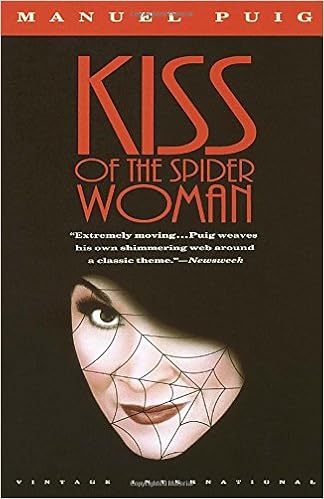--I'm sorry it's over.
--So what, I'll tell you another one.
--No, it's not that. You're going to laugh at what I'm going to tell you.
--Let's have it.
--I'm sorry because I've attached to the characters. And now it's all over, and it's just like they died.
--So, Valentin, you too have a little bit of a heart.
--It has to come out some place... weakness, I mean.
--It's not weakness, listen.
--Funny how you can't get along without becoming attached to something... It's... as if the mind had to secrete affection without stopping...
--You think so?
--...same way your stomach secretes juices for digestion.
--You really think so?
--Sure, like a leaky faucet. And those drops continue dripping on anything, they can't be turned off.
Two men share a cell in an Argentine prison. One, Valentin, is a young revolutionary who has given his life to the Marxist cause. The other, Molina, is a gay windowdresser who often slips into describing himself as a woman. They are an unlikely pair, but thrown into the cell they form a connection, you might say because they have no one else to connect to. But that's not quite right: they form a connection because the cell, though a place where a grave injustice is committed upon each of them, is a self-contained world in which they are free to discover each other unencumbered by the obligations or social pressures that circumscribe them in the outside world.
Kiss of the Spider Women is written almost entirely in dialogue. Most of that dialogue is Molina recounting to Valentin, with a detailed memory and a sense of flair, movies that he has seen. It's through these films that Molina and Valentin process their own ideas of themselves, and come to know each other.
It's a brilliant setup that succeeds because the films that Puig invents are generally gripping. The first is a supernatural thriller in which a woman enters into a sexless marriage because of an old legend that her ancestors turn into panthers when they kiss a man. This film lets Puig explore the contours of both Molina and Valentin's sexuality, and foregrounds the hope and dangers of sex as a transformative experience. (This is echoed by Molina's obsession with the films themselves, which offer a kind of transformation-by-proxy, which is passed on to Valentin as well.) The second is a beautiful romantic drama that alienates Valentin because it is also a thinly-veiled piece of Nazi propaganda. Molina doesn't care; its beauty is his highest principle, but Valentin cares quite a bit. It's easy to share Valentin's disappointment when the movie is over because we, too, are drawn into the synopsis.
Puig slowly introduces more elements. At times he reports the characters' thoughts in the middle of their dialogue; and he includes, footnote-style, a strange synopsis of the medical arguments surrounding the source of homosexual behavior. A coda at the end is framed as a secret police report. The novel overall is a masterpiece of control; Puig seems to know exactly when and how to tinker with the minimalism we're made to expect. But there's never any real narrative, and the distance that creates permits us to appreciate scenes whose physicality otherwise might be alienating: when Molina helps clean off Valentin, whom has become very sick and defecated himself, or the moment when the two men have sex for the first time.
Kiss of the Spider Woman does become a gay romance, but a lucid and clear-eyed one. It neither asks us to believe that Molina drags Valentin out of some closet, nor dismisses Valentin's choice as one of expediency or desperation. It asks us to imagine the way in which emotional and spiritual connections can become physical ones, and the way in which those connections can transform us in ways that defy our narrower conventions.


No comments:
Post a Comment